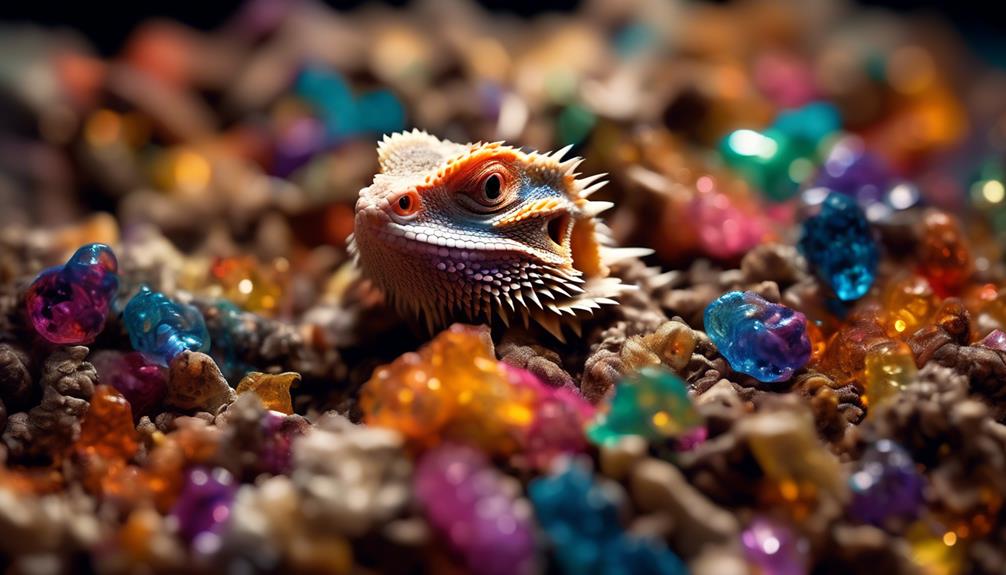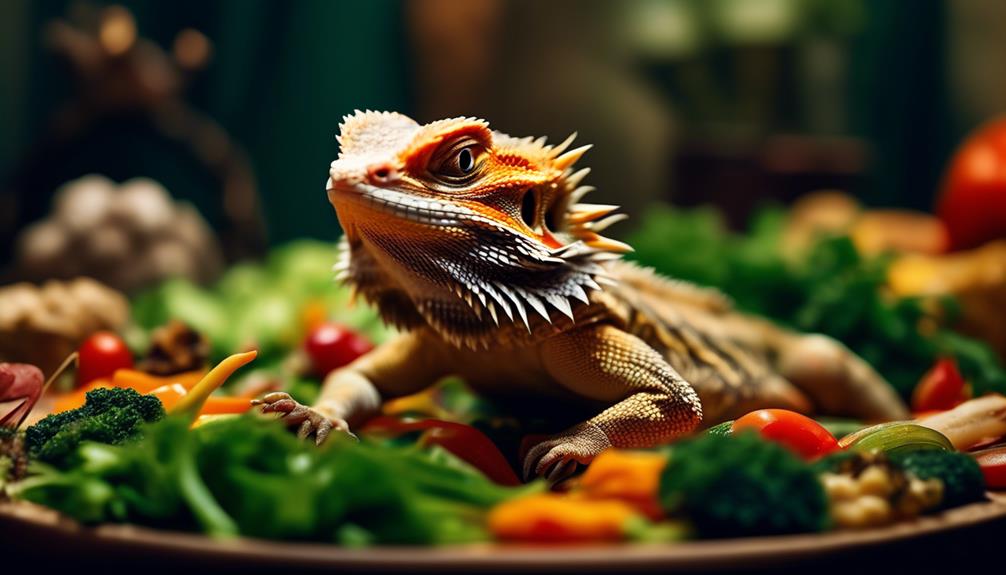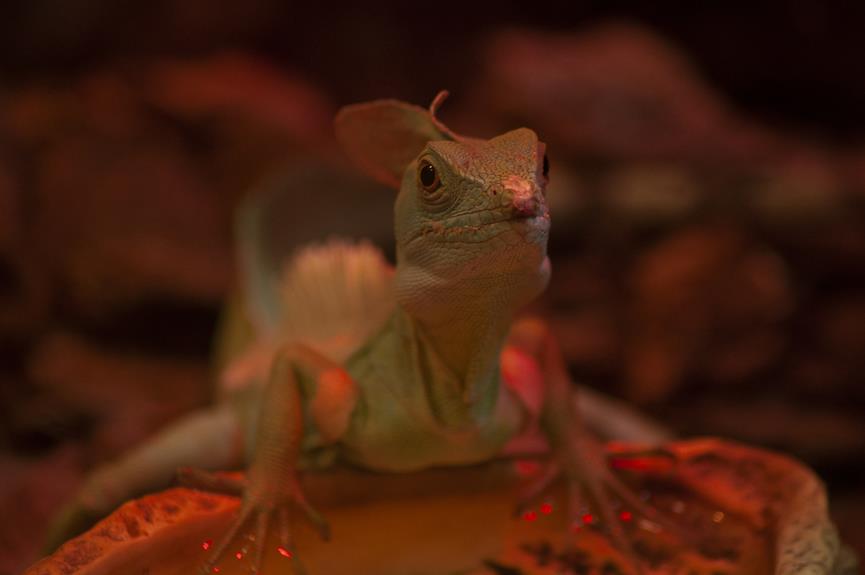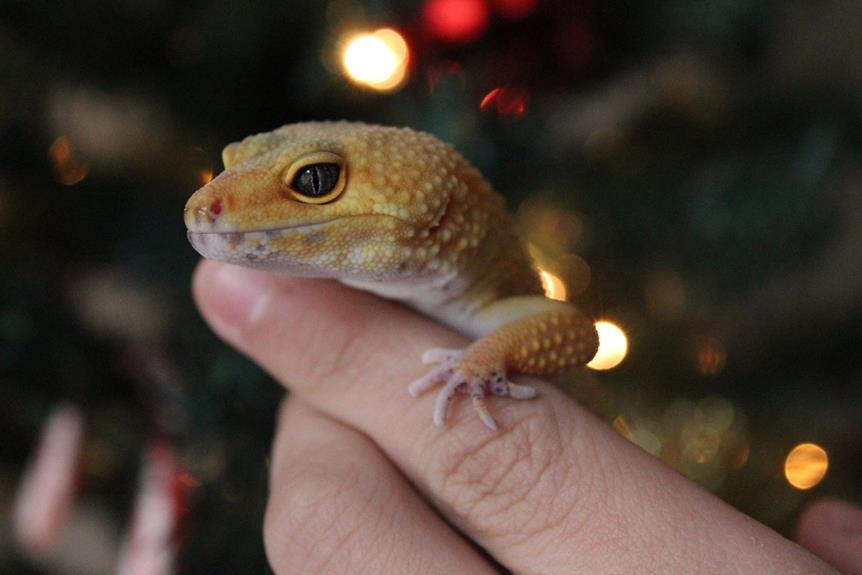Ah, the mysteries of bearded dragon poop. Who would have thought that such a topic could captivate our minds and keep us on the edge of our seats? Well, my friends, prepare yourselves for an exploration into the depths of bearded dragon bowel movements.
We are about to uncover the secrets hidden within their excrement, and trust me, it's not as mundane as you might think. From the colors to the consistencies, there is much to discover about these fascinating creatures through the lens of their poop.
So, buckle up and get ready to embark on a journey that will leave you both enlightened and intrigued.
Key Takeaways
- Normal bowel movements in bearded dragons consist of brown, log-shaped feces and white urate waste from the kidneys.
- Chalky and hard white urate indicates an excess of calcium in the diet, which should be adjusted by reducing calcium-rich foods and supplements.
- All-white poop can indicate over-hydration, but if the white part is hard, chalky, or off-color, it may indicate a problem that requires further attention.
- Runny poop in bearded dragons can be caused by diarrhea, which may result from overhydration or parasites. Prompt treatment is necessary to prevent dehydration.
Normal Bowel Movements in Bearded Dragons
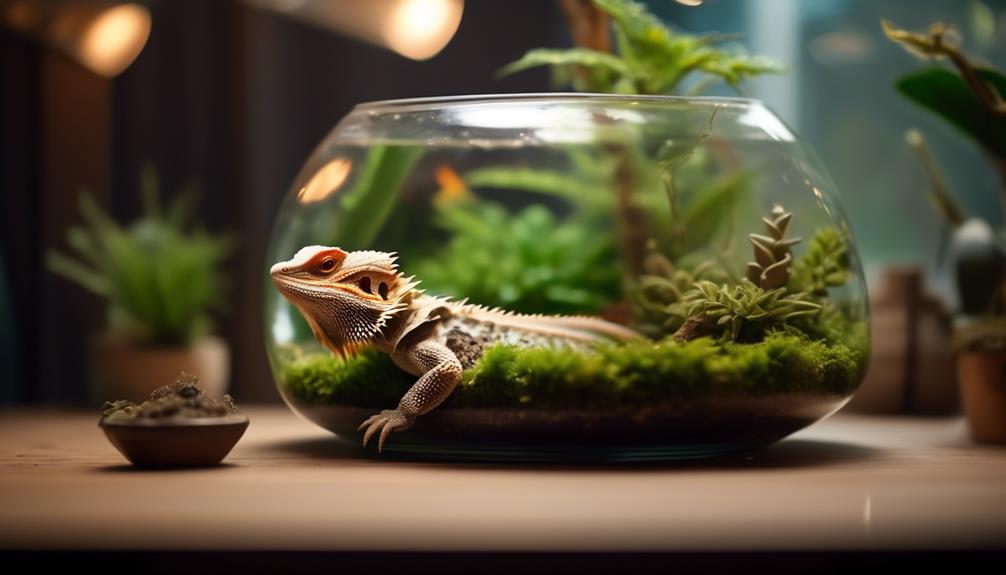
Normal bowel movements in bearded dragons consist of a brown, log-shaped part and a white urate, which is a waste product from their kidneys. This brown and white coloration is a sign of a healthy digestive system.
The brown part of their bowel movement is formed and log-shaped, indicating that their food is being properly digested. The white urate, on the other hand, is a byproduct of their kidneys and is excreted along with their bowel movements. It's important to note that bearded dragons don't pee, so the urates come out with their feces.
This distinct brown and white coloration is a good indicator that their digestive system is functioning well and that they're receiving the necessary nutrients from their diet.
Chalky and Hard Urate
Moving on from the discussion on normal bowel movements in bearded dragons, we now turn our attention to the topic of chalky and hard urate.
Chalky and hard white urate in bearded dragon poop can indicate an excessive amount of calcium in the diet. To prevent this, it's important to adjust the dragon's diet by reducing calcium-rich foods and potentially cutting back on calcium supplements.
Soft white urate, on the other hand, is considered normal and healthy. However, chalky and hard urate should be addressed promptly to prevent potential health issues.
All White Poop
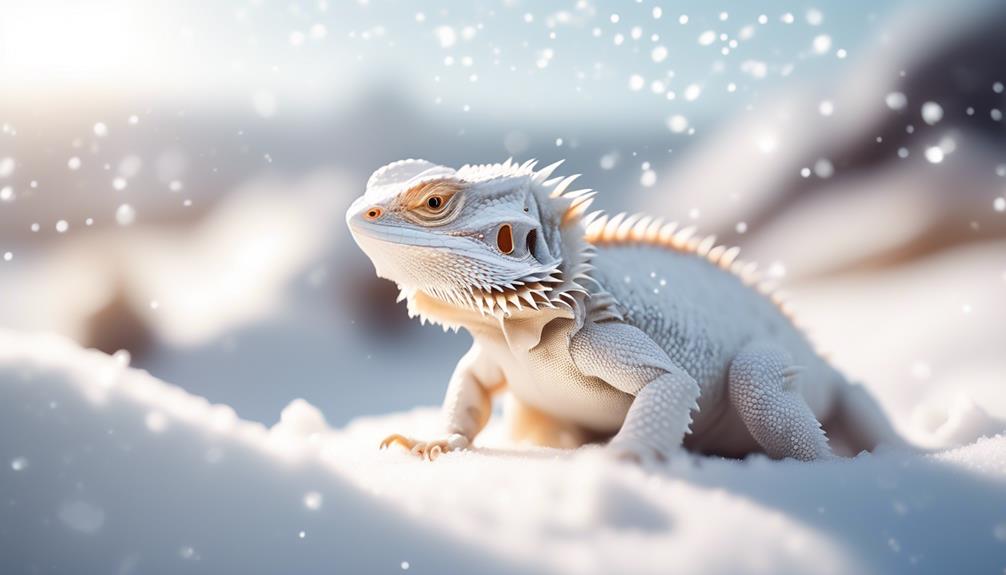
All white poop in bearded dragons may indicate over-hydration and should be monitored for any abnormalities in consistency or color. While the white part of the poop, known as urate, is normal and healthy, it's important to differentiate between normal and abnormal all white poop.
Normal all white poop will have a soft consistency and will be chalky in appearance. However, if the white part is hard, grainy, or off-color, it may indicate a problem. Possible causes for abnormal all white poop include dehydration, liver issues, or an imbalance in the dragon's diet.
To remedy the situation, it's crucial to ensure proper hydration, adjust the dragon's diet if necessary, and seek advice from a veterinarian if abnormalities persist. Monitoring the consistency and color of the poop is key to maintaining the health of your bearded dragon.
Runny Poop
Runny poop in bearded dragons can indicate diarrhea, which may be caused by overhydration from leafy greens, fruits, or horn worms, or by parasites such as coccidia.
Diarrhea in bearded dragons can lead to dehydration, which requires prompt treatment. Overhydration can occur when the dragon consumes excessive amounts of water-rich foods. This can dilute the stool, resulting in a runny consistency.
On the other hand, diarrhea caused by parasites like coccidia will have a more foul odor and unformed appearance. To treat runny poop, it's important to identify and address the underlying cause.
Adjusting the bearded dragon's diet, reducing water-rich foods, and ensuring a clean and hygienic environment can help resolve overhydration-induced diarrhea. In the case of parasitic infections, appropriate medication prescribed by a veterinarian is necessary to eliminate the parasites and restore the health of the bearded dragon.
Yellow Poop or Yellow Urate
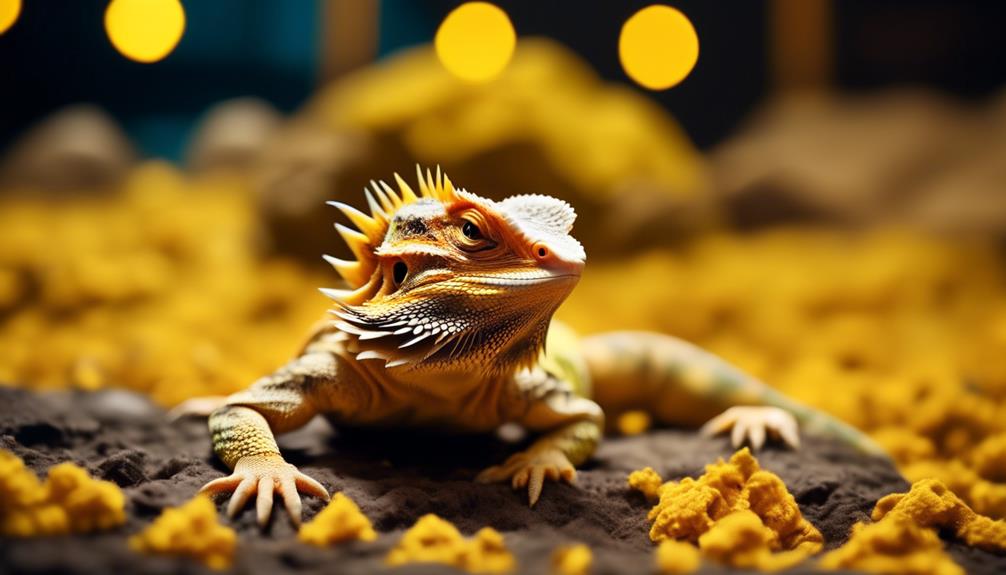
As we continue our exploration into the various aspects of bearded dragon poop, let's now turn our attention to the topic of yellow poop or yellow urate.
The presence of yellow coloration in the bowel movements of bearded dragons can be attributed to a few different factors. Firstly, consuming red fruits can result in a yellowish tint to the poop. However, it's important to note that this color change is harmless and doesn't indicate any health issues.
On the other hand, yellow urates may be indicative of liver problems. If the urates appear off-color or yellowish, it may be necessary to have the dragon undergo bloodwork for diagnosis.
Additionally, yellow poop can also be a sign of dehydration. To address this, it's crucial to increase hydration in the dragon's diet and closely monitor the color and consistency of the poop for any changes.
Frequently Asked Questions
Can a Bearded Dragon's Poop Change Color Based on What They Eat?
Yes, a bearded dragon's poop can change color based on what they eat. The effects of diet on bearded dragon poop include changes in color, such as yellow from red fruits, or white from a high calcium diet.
How Can I Tell if My Bearded Dragon Is Dehydrated Based on Their Poop?
If a bearded dragon is dehydrated, their poop may appear dry, clumpy, or lacking in moisture. To prevent dehydration, ensure they have access to clean water and a well-balanced diet with hydrating foods like leafy greens.
What Should I Do if My Bearded Dragon Has Runny Poop?
When a bearded dragon has runny poop, it can be caused by overhydration or parasites. To treat it, adjust their diet to reduce leafy greens and fruits, and seek veterinary advice if the problem persists.
Are There Any Specific Foods That Can Help Regulate a Bearded Dragon's Bowel Movements?
Certain foods can help regulate a bearded dragon's bowel movements. Avoid foods that can cause digestive issues, such as canned insects or foods high in fat. To prevent constipation, provide a balanced diet with plenty of leafy greens and a variety of insects.
Can Stress or Environmental Factors Affect a Bearded Dragon's Poop?
Changes in the environment and stress can impact a bearded dragon's bowel movements. These factors may cause irregularities in digestion, leading to abnormal poop consistency and color. Monitoring and addressing these changes is important for the dragon's health.
Conclusion
In conclusion, understanding the different types of bearded dragon poop can provide valuable insights into their health and well-being. By observing the color, consistency, and content of their waste, we can make necessary adjustments to their diet and ensure they're receiving the proper nutrition.
Like a painter's palette, their poop reveals a vivid picture of their digestive system, allowing us to provide the best care for these fascinating reptiles.
